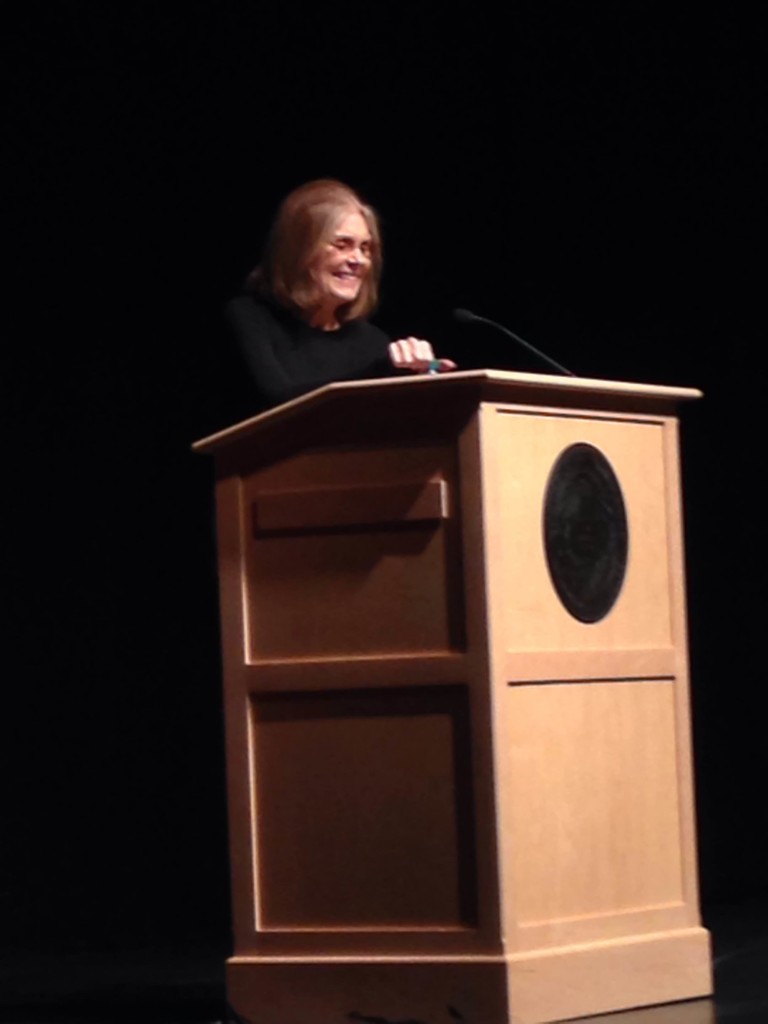
In many ways, I wish I didn’t have to hear the talk I did from Gloria Steinem this week. For over 55 years, Steinem has been a leading voice for the feminist movement, and even after 55 years, her messages continue to ring true.
We can listen to Steinem talk about abortion in 1969 and add it to the political dialogue that has led the Supreme Court to take on the case of Texas Abortion Clinics, which will be decided in June 2016. We can read her 1978 article “If Men Could Menstruate” and think that it had been written yesterday in response to the luxury tax on pads and tampons that over 40 states enact. Or we can re-publish her article “The International Crime of Female Genital Mutilation” – printed in 1979 – knowing that 21% of girls in the world today are born into the countries that continue with these practices.
Which is why there’s a part of me that wishes Steinem’s talk in Blackman this past Thursday could have been wildly different — because that would mean we made more progress than we did in the last half a century of her work.
That’s not to say nothing has changed during her time. Steinem emphasized the new era and shifting tides that we are currently experiencing — and how important it is that we continue building momentum: raising awareness, creating platforms for oppressed voices to be heard, and bringing these dialogues into the public consciousness. Even though change is a slow and laborious process, Steinem noted that it is happening and the discourse is shifting in the right direction.
Steinem’s talk wasn’t just about feminism or politics or social change. Instead, it was about unity. Connection. Interdependence. Intersectionality. Without this, there is no progress. And in this increasingly polarized social and political environment, her message drew a stark contrast to the rhetoric we’re so used to hearing.
We can no longer act in silos, keeping our heads down and falling back on the excuse that we’ll join their fight once we win ours. There probably shouldn’t even be an “us” and “them”. Instead, we should be asking questions, listening to one another, telling our stories, creating space for intimate connections to form – so then we can join together without judgement or labels or misperceptions. It is in that place that sustainable change can occur. As Steinem said, “Any group judgement becomes a problem, and the only way out is to tell our stories.”
Within this call to action, there was optimism; a fiery spark of hope that we are at the precipice of change, if only we could take the step forward and dive into the deep end. To do so would require jumping off together. It would require an acknowledgment of the very real day-to-day and systemic oppressions and inequalities that face women, people of color, LGBTQA+, non-binary folks, people with disabilities, indigenous communities, low-income individuals and our Mother Earth. It would require a change in dialogue that equates equal pay with $400 billion stimulating the economy (the biggest stimulus yet); that understands domestic and gender-based violence is the best predictor of violence outside of the home and the number one indicator of a country’s development. It would shine light on the fact that the languages of many of the native inhabitants of this country didn’t even acknowledge gender, let alone create a binary that dictates a person’s choices based on which end they are confined to.
While getting to this point will likely continue to be an uphill battle, Steinem advocates that we must use the means as our end. She said we can’t expect to love, dance, sing, create art, have sex, be empathetic and experience kindness as the end goal if we aren’t loving, dancing, singing, having sex, being emphatic and experiencing kindness in the now. We should be using what we have to create the existence that we want instead of waiting for an end that’s not yet in sight. To do this, we must join together.
“God may be in the details, but the Goddess is in the connections,” Steinem said.
Even though in an ideal world, we wouldn’t need Gloria Steinem to come to our campus to remind us that unity is key, that we must listen and tell our stories and let other stories be heard – that instead she might come to campus to share stories about “back in the day when…” and we would laugh because it seems so far-fetched that women would ever get paid less than men – despite this, I can at least stand a bit taller knowing there are people like Steinem, and like all the individuals that filled the auditorium, who are demanding change, fighting for justice and reaching out to one another to lift each other up in the process.
I’ll be looking forward to that day when Steinem comes back and says, “We did it.” Until then, I’ll be continuing the work, demanding greater equality for all.